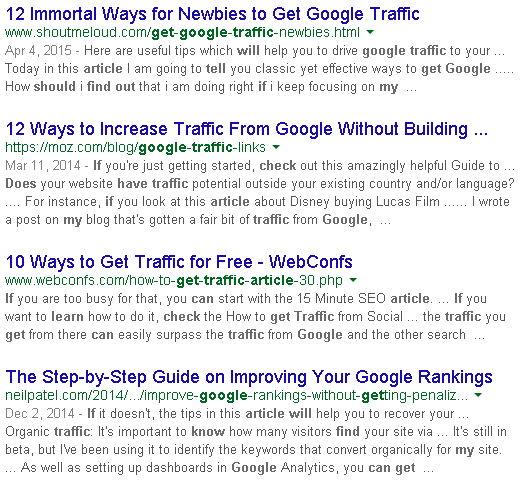How to know whether my blog post will attract traffic or not
One of the evergreen topics for discussions in the blogging world is SEO, and especially the various ways of attracting bless of the all-pervading search engines to one’s own site or blog. There are various ways to approach this problem, some of the popular ones are:
- Using meta tags like
keywordanddescriptionto attract the search engines. - Performing keyword research (using Google’s planner tool or similar).
- Getting link juice through social media marketing i.e creating backlinks.
- Hiring SEO experts or web designers to get some more arcane suggestions.
But lost in these technical details, folks are forgetting one basic foundation upon which the Internet is built: Content is King. Yes, the sad truth is that Google (or Yahoo/Bing for that matter) cannot be fooled by any of these tools in the long term. Doing some social media marketing on Facebook might place your article on #1 position for a short period of time, but sooner or later, Google will figure out whether your content is actually worth it or not.
But how do you write good content, and also ensure that it has some uniqueness that the million other sites on the Internet don’t already have? Well, I can’t help you with the first question. Since only you know what your area of expertise is, only you can come up with a good topic and subject-matter for your blog or site. For instance, Web Development is my area of expertise, and I came up with this particular topic you are reading right now.
But I can help you with the second question. Doing some research on this matter and performing a topic-wise traffic analysis of my blog has proven this one thing: Content is King. So, my method of figuring out whether an article/post will rock or not, is based upon this simple canon. Once you decide the topic and subject-matter of your next blog post, do this simple reality check before you even bother drafting it:
Almost every googler is looking for a specific solution for a problem or issue, be it shopping for a product, knowing a URL address or researching something. So, your next post or article should solve that problem in order to pass the content test. To get a quick idea of the competition, perform a google search from the perspective of your potential googler! A glance at the results will instantly tell you whether this problem is already solved, and by how many.
For instance, before publishing this article, I did this simple Google search:
How to know whether my blog post will attract traffic or not
And this is what I got:

All those are top ranking sites and deserve to be on page one (no offense meant to them). However, for someone specifically looking for a solution to this question (agreed, however small that set of users be), none of them have an immediate answer that could be surmised by the search result summary. Whilst they are all making clear points about ways to increase search engine traffic, none of them talk about knowing, in priory, whether a given method will work or not. So, at least for this particular query (maybe used by about 1% of all bloggers), this blog post deserves to be amongst the page one results.